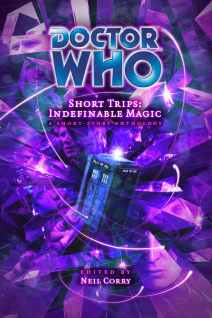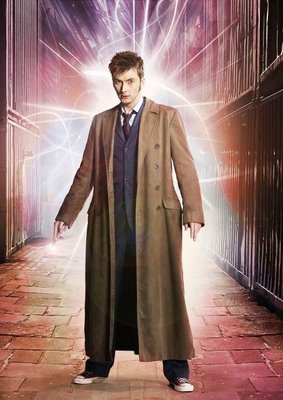As mentioned in our most recent podcast, Michael Coen, overall winner of Big Finish’s Doctor Who short story competition, was kind enough to answer our questions about his story, what it’s like to win, and what he thinks of Doctor Who!
Hi Michael. What’s your favourite Doctor Who story?
Oh…let’s say The Robots of Death (classic series) and Father’s Day (new series).
What’s your favourite Big Finish Doctor Who story?
Probably Jubilee or Spare Parts.
What contribution do you think Big Finish has made to Doctor Who as a
whole?
The audios and short trips allow an exploration of themes and stories that wouldn’t work in a prime-time, 45 minute TV show.
What’s the title of your own short story?
Homework.
What’s your story about, briefly?
I couldn’t describe it any better than BF did in the following tease…
Norman’s homework worries his teacher. Instead of a trip to the beach or the zoo, it’s about meeting a man from the future. Norman of course knows better than to talk to strange men, but this is his own grown-up self. Surely he can’t mean any harm… Can he?
Give us a random phrase or short sentence as a teaser.
“He DID look a bit like my Dad but he was fatter and very scruffy, not at all like men from the future.”
What inspired your short story?
I guess I was riffing on the hoary old question of ‘if you could go back in time and leave a message for someone, what would you say?’ You would like to think that, given the opportunity, you would say something profound and significant, wouldn’t you?
What other writing projects do you have coming up?
I have a short story entitled ‘Ivory’ in the Pantechnicon Book of Lies. Apart from that I have a few spec stories and scripts ‘out there’ and I’m currently reworking a TV Series idea into a novel.
What’s the best writing advice you’ve been given?
Some of the advice from the Big Finish Competition (and reprinted in HTDCML) was really useful, particularly Andrew Cartmel’s advice that too much preparation and theorising is the death of imagination. As someone who is prone to making endless notes rather than starting to write I try to bear that advice in mind. <
Has Doctor Who changed your life?
The competition got me writing again (after a hiatus of many years) and encouraged me to submit for the first time. Spurred on by publication, I now can’t stop. Other hobbies have gone by the wayside, my keyboard is worn down and I’m loving every minute of it.
Some (slightly edited) reflections on the competition, which I posted on Outpost Gallifrey in response to a prompt from a poster:
I was, and still am, absolutely thrilled to have a won the competition. My story has been published twice by Big Finish, I got a publicity page on the BBC Who site alongside a picture of the Patrick Troughton (which a colleague of my sister assumed was a picture of me), my story was reviewed in DWM (‘scary’), I’ve been recognised by a couple of closet Who fans at work (‘Was that YOU?’) and I’ve had the chance to pitch some more ideas to Big Finish. I’ve also had invaluable advice from Ian Farrington and, especially, from Simon Guerrier who not only devoted what must have been a huge amount of time to running and judging the competition but who has also taken the time over the last year to encourage and advise all the competition winners when, to be honest, he really didn’t need to. Perhaps most importantly, the process of entering the competition spurred me to start writing regularly, while actually winning it gave me a huge confidence boost in relation to my writing.
The whole experience has exceeded any expectations that I had. Really there is no ‘golden ticket’ when it comes to writing, certainly not when you are starting out. The Big Finish competition gave me, and 25 other writers, our first shot at publication. What comes next is up to us. All we can do is keep writing, keep submitting (to anywhere that might read our efforts) and hope that, over time, we begin to make a name for ourselves.
To those who missed out on the last competition, or would like to see another one, I would encourage you all to keep writing, but don’t hang your hat on a single opportunity. Look at the writers who are writing for Who in all its incarnations now. Each one of them will have a different story to tell about how they broke into the business and how they built a career in it.
I guess if you are a writer, at whatever level, you have to believe that if you keep writing (and reading and listening to criticism and reflecting on your own work) then your work will improve, and if your work becomes good enough, and if you are persistent enough, then someone, somewhere will recognise that. And if it doesn’t work out that way, then at least you will have devoted the time to an enjoyable and fulfilling pastime.
And a general comment on How The Doctor Changed My Life (HTDCML)…
Reading the other stories in HTDCML it’s clear that there is a real depth of writing talent out there. I’ve no doubt that we’ll hear from many of these authors again.
Reading the collection as a whole, the stories strike me as having a real freshness and vitality about them, together with an obvious affection for Doctor Who in all its incarnations. In many ways the book illustrates perfectly what a great story-telling engine Doctor Who is; accommodating a great diversity of approaches and ideas which all still ring true as Doctor Who adventures.
Thanks Michael, and all the best for the future! You can listen to our podcast on Short Trips: How the Doctor Changed My Life here, including interviews with other contributors, plus editor Simon Guerrier, and Doctor Who writer Rob Shearman.
 From the Fifth Crusade to the new Star Trek movie, our new podcast is every bit as varied as its subject matter – the new Short Trips collection from Big Finish, featuring a story by our very own Caleb Woodbridge!
From the Fifth Crusade to the new Star Trek movie, our new podcast is every bit as varied as its subject matter – the new Short Trips collection from Big Finish, featuring a story by our very own Caleb Woodbridge!

